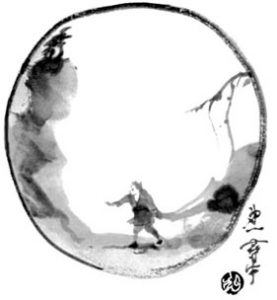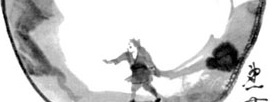The first Ox Herding Picture is “Searching for the Ox” (尋 牛)
忙 忙 撥 草 去 追 尋
busy busy pulling grass go chase search
水 闊 山 遙 路 更 深
water wide mountain distant path deeper
力 盡 神 疲 無 處 覔
strength finish spirit tired no place [left to] seek
但 聞 楓 樹 晚 蟬 吟
only listen maple tree evening cicada sing
Notes:
Line 1: 撥 草 is found in an old proverb: 拨草瞻风 “pluck the grass and see the wind”
Line 2: 更 深 is a character combination that means “deeper”
Line 4: 但 聞 is an old literary/poetic formula for “all one could hear was”, but literally: “only listen”
Also see Stanley Lombardo’s translation (from here):
Searching through tall, endless grass,
Rivers, mountain ranges, the path trails off.
Weary, exhausted, no place left to hunt:
Maples rustle, evening, the cicada’s song.
And three different versions of the “original” Chinese are here:
https://terebess.hu/english/Chinese.pdf
The phrase 拨草瞻风 is found in the “Record of Dongshan”. William F. Powell explains the phrase like this:
“To push aside the grass and gaze into the wind” is a play on a line from the Confucian Analects suggesting the ability to distinguish the superior man from ordinary people. “The superior man’s deportment is like the wind; ordinary people’s is like grass. When the wind blows over it, the grass bends.” Lun-Yü 12: 19.
[footnote #21 here: https://terebess.hu/zen/dongshan-eng.html]
The English phrase “Plucking the grass, to know where sits the wind” is found in Act 1, Scene 1 of Shakespeare’s play “The Merchant of Venice”. It is spoken by Salanio.

And even Edna St. Vincent Millay’s little poem “Afternoon on a Hill” seems to have a cheerful, if distant, echo of this whole business with the grass, and the wind, and fading light:
I will be the gladdest thing
Under the sun!
I will touch a hundred flowers
And not pick one.
I will look at cliffs and clouds
With quiet eyes,
Watch the wind bow down the grass,
And the grass rise.
And when lights begin to show
Up from the town,
I will mark which must be mine,
And then start down!
https://poets.org/poem/afternoon-hill
